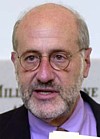 Santa
Barbara News-Press, Feb. 12, 2005
Santa
Barbara News-Press, Feb. 12, 2005
Western culture takes a hit at UCSB
Mandatory courses in European civilization reduced
By MORGAN GREEN
NEWS-PRESS STAFF WRITER
After nearly five years of sometimes bitter debate, the UCSB Faculty Legislature has reduced the mandatory study of European civilization for most undergraduates, a move echoed at many universities in a more "global" world.
The new rule "means that your kid will not necessarily get as much Western civilization as before," said physics professor Omer Blaes, a leading proponent of the change.
On an overwhelming vote by the Faculty Legislature made public this week, the required "European Traditions" requirement is reduced from two 10-week courses to one for all students seeking a bachelor of arts degree.
While the reduction amounts to a "tweak" to the long list of course requirements, faculty leaders say it raised serious philosophical differences. How important is the study of Western culture now that the view from Tehran or Tokyo ranks with that from London or Paris -- especially with trends like the economic ascendancy of Asia and the culture clash between traditionally Islamic and Christian spheres.
The change eliminates an "artificial" elevation of Western civilization as an academic staple, said some, although others maintain that students should have a broad understanding of the West because of its profound and continuing influence on the rest of the world.
 |
"Our students' knowledge about the history of our civilization is shallow," said religious studies professor Richard Hecht, who teaches Western civilization and global studies courses. "Western civilization has marked the entire globe in the 20th century. Therefore, even if you don't think (it) is so hot, you still want to know a lot about it because it is one of the forces that created modernity."
The marathon debate demonstrates a widely understood reality -- changing a university general education requirement, even a small one, is a big deal. Those rules define what constitutes a "well-rounded" university education, and can influence which campus academic units thrive or lose students and funding.
Changing so-called general education requirements to incorporate international themes is a major trend nationwide, according to Jerry G. Gaff, a senior scholar with the Association of American Colleges and Universities.
Supporters of the change here questioned why the university was requiring two Western civilization courses, "and Western only," said Mr. Blaes. "Why was (it) on this pedestal, if you like? In fact, the distinction is a little artificial. Citizens need to be more aware of the world as we move toward globalization."
The new rule does not require students to take more courses with international themes. Rather, they must select three courses from a wider "Culture and Thought" list that includes several with a European-focus.
The former requirement covered different periods of Western development and was necessary, Mr. Hecht said, to gave students a vital breadth of knowledge.
Requiring a couple of related Western civilization courses "is not really giving students depth," countered Mr. Blaes.
And other proponents, like Randolph Bergstrom, associate professor of history and co-chair of the Faculty Legislature's Undergraduate Council, said, "It's time to open it up and allow more choice."
Complicating the debate, Mr. Hecht believes that providing "nothing more than a menu" of courses for students would lower the overall quality of basic education at UCSB. "We should make stronger requirements with higher expectations," he said. "I'd rather beef up both" the Western and world studies requirements.
Aside from that, he said, the new requirement will undermine some academic departments as students choose classes in others.
An analysis was performed to see if any department would be harmed by the change, said Mr. Bergstrom. "In the short term, not much is going to happen."
There are many other ideas among the faculty to improve the general education process. But it won't happen for a long while, said Mr. Blaes. "This particular change took so much effort and there was so much acrimony. The campus needs to calm down."
e-mail: mgreen@newspress.com